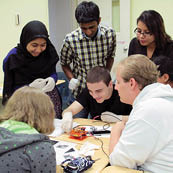
During eight weeks this summer, the Farquhar College of Arts and Sciences hosted a variety of interactive learning sessions at NSU as part of a psychology summer camp for local high school students. Students from five schools participated, including Cooper City, Cypress Bay, Longmeadow, Plantation, and Stranahan.
Several college faculty members from the Division of Social and Behavioral Science and the Division of Math, Science, and Technology led the 16 sessions, with each discussing their areas of research and academic focus. The camp was co-organized by Jaime Tartar, Ph.D., associate professor and coordinator of psychology research, and Jonathan Banks, Ph.D., assistant professor.
According to Banks, the idea for the camp stemmed from a successful South Florida Psychology Bowl event held earlier in the year at NSU.
“We were impressed with the level of enthusiasm and aptitude from the Broward County high school students who participated in the Psychology Bowl,” Banks said. “This program was developed to provide a vehicle for introducing these bright students to cutting-edge research in the fields of cognition and behavioral neuroscience.”
Sessions covered various topics related to neuroscience: cognition, development, evolutionary psychology, perception, and physiological psychology. Students also participated in hands-on activities, such as stressor-task demonstrations, testing neurons in roaches, analyzing hormone levels, and electrophysiology and cognitive-task demonstrations.
The summer camp concluded with a poster session showcasing the students’ collaborative research conducted during the program. This included research on “The Effect of Color on Cortisol Levels,” “The Mind of a Psychopath,” and “Social Expectations and Perception: Women’s Weight and Make-Up Effect on Hiring Rates.”
Twelve high school students participated in the free camp, which was supported by a grant from the Society for the Teaching of Psychology.
“This program was very successful, thanks largely to the involvement of faculty across disciplines who shared their expertise with the students,” Tartar said. “We are excited about the potential of growing the summer program to involve more students and faculty in the future.”

